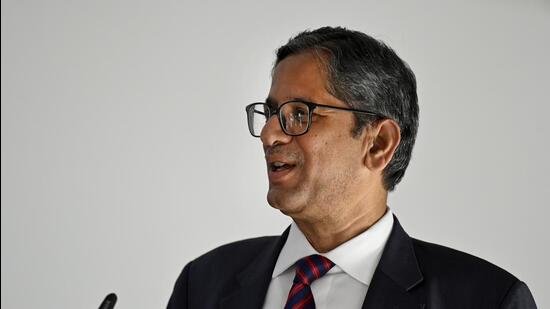Space for Opposition shrinking, laws being passed sans scrutiny: CJI Ramana
Speaking at an event — 75 years of Parliamentary Democracy — on an invitation by the Rajasthan Legislative Assembly, CJI NV Ramana reminisced about the past when he used to look forward to legislative debates where leaders in the Opposition played a stellar role.
The space for political opposition is diminishing in the country, which is not a sign of a healthy democracy, Chief Justice of India NV Ramana said on Saturday.

Speaking at an event — 75 years of Parliamentary Democracy — on an invitation by the Rajasthan Legislative Assembly, CJI Ramana reminisced about the past when he used to look forward to legislative debates where leaders in the Opposition played a stellar role.
“There used to be a lot of mutual respect between the government and the opposition,” said CJI Ramana.
Also Read: Undertrials’ extended imprisonment needs urgent attention, says CJI Ramana
“Unfortunately, the space for opposition is diminishing. We are witnessing laws being passed without detailed deliberation and scrutiny. Instead of engaging in meaningful debates for furthering democracy, politics has become acrimonious. The diversity of opinion enriches polity and society. Political opposition should not translate into hostility, which we are sadly witnessing these days. These are not signs of a healthy democracy.”
The absence of such debates is proving to be a burden on the judiciary because of imperfections in lawmaking, the CJI said. “In the absence of a thorough debate involving all the sides of the house, as a judge at times I wonder as to how does one trace the legislative intent behind the enactments,” said CJI Ramana. “Laws without deficiency save the judiciary from the avoidable burden of litigation.”
In a modern democracy, people expect the courts to stand as a counterweight to legislative and executive excess, he pointed out. “This gains gravity, particularly whenever the opposition is missing in action,” CJI Ramana stated in his speech.
He reminded that India was meant to be a parliamentary democracy and not a parliamentary government, for the core idea of democracy is representation and “strengthening parliamentary democracy demands strengthening the opposition as well.”
The CJI also tore into the trend of fewer legislative sittings. The country is witnessing a decline in the quality of legislative performance, he said. Although the Constitution does not specify any minimum number of sittings for any state assembly in a year, “there is no doubt that citizens will definitely get benefited by longer engagements”, he said.
Also Read: CJI Ramana's reply after Kiren Rijiju flags concern over 5 crore pending cases
Since lawmaking is a complicated exercise and needs legal assistance, members of legislature can consider getting assistance of qualified law clerks, just as judges have law clerks to assist them with the daily court work, the chief justice suggested.
The CJI raised concerns over the quality of legislative performance.
“There used to be mutual respect between the government and opposition. Unfortunately, space for opposition is diminishing,” he said.
“Sadly, the country is witnessing a decline in the quality of legislative performance,” he said, adding that laws are being passed without detailed deliberations and scrutiny.






